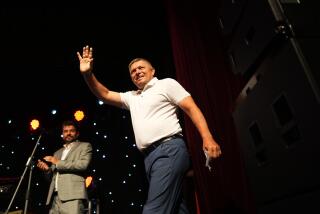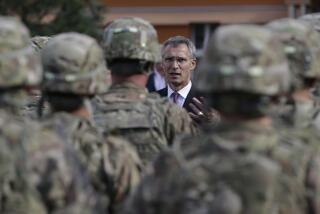Czechs Prod Soviets to Exit : Presence of Troops Held Illegal
- Share via
PRAGUE, Czechoslovakia — The new government said today that the presence of 80,000 Soviet troops in the country is illegal and that it has begun talks with Moscow on their removal from Czechoslovakia.
In his first news conference since becoming foreign minister Sunday, Jiri Dienstbier said today that he held “preliminary talks” with Soviet representatives on the pullout of 80,000 Soviet troops.
The discussions extended those begun by Dienstbier’s predecessor, Jaromir Johanes, in Moscow after the Malta summit between Soviet President Mikhail S. Gorbachev and President Bush.
“I believe that we shall soon be able to arrive at some concrete conclusions, some common understanding,” Dienstbier said.
The bilateral talks should run parallel with disarmament talks in Vienna between NATO and the Warsaw Pact, which have already set the goal of agreement on troop cuts in Europe by the end of next year.
Dienstbier noted that the Moscow Protocol and the agreement allowing the presence of Soviet troops in Czechoslovakia “have been rendered invalid under international law because these agreements were made under pressure.”
Alexander Dubcek, who led the reforms of the “Prague Spring” crushed by the Soviet invasion in 1968, signed the agreements after he was ousted and flown to Moscow.
Also today, the Communist Party denied that it has reached a final agreement with the opposition on choosing a president, saying a final decision must be made at a party congress Dec. 20-21.
But the party did not deny the substance of an agreement with opposition leaders that will lead to the nation’s first non-Communist president in 41 years. The agreement was reported Wednesday by opposition sources.
The government and the opposition agreed Wednesday that Parliament will choose Czechoslovakia’s next president by the end of January, with the stipulation that he be a Czech not affiliated with any political party.
No agreement was reached on who would be president, but the accord sets the stage for the election of Vaclav Havel. The playwright and former political prisoner has been the key figure in the peaceful revolt that ended the Communists’ monopoly on power.
It also seemed to rule out any chance at the presidency for Dubcek, a Slovak. A Czech is stipulated for the presidency to balance the ethnic background of the new Communist premier, Marian Calfa, also a Slovak.
The presidency is largely ceremonial, but it has great symbolic importance because of the respect the first president, Tomas Garrigue Masaryk, enjoyed in the independent Czechoslovakia he founded in 1918.
A statement issued at the conclusion of the talks Wednesday night also called for the ouster from Parliament of lawmakers “who do not provide guarantees of political democracy.”
The statement did not specify how the deputies would be replaced.
A strong Communist majority runs the 350-member Parliament which, under the constitution, had 14 days from the resignation of President Gustav Husak on Sunday to choose a new president.
More to Read
Sign up for Essential California
The most important California stories and recommendations in your inbox every morning.
You may occasionally receive promotional content from the Los Angeles Times.













